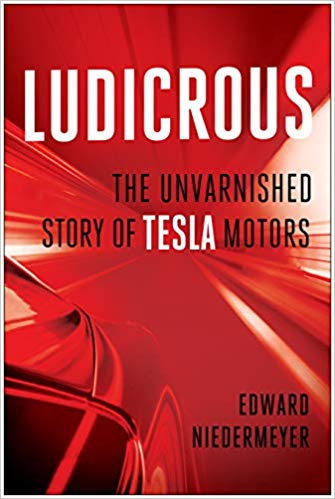You have /5 articles left.
Sign up for a free account or log in.
 Ludicrous: The Unvarnished Story of Tesla Motors by Edward Niedermeyer
Ludicrous: The Unvarnished Story of Tesla Motors by Edward Niedermeyer
Published in August of 2019
Let us know if you’ve had these thoughts? Traditional colleges are like legacy auto manufacturers. The seat time based high-cost residential education and credentials that we provide are like gas-powered internal combustion engine-powered vehicles. The future belongs to electric self-driven cars, and competency-based lifelong mobile online learning.
Following this line of reasoning, one might conclude that universities should try to be more like Telsa and less like Ford.
We might even think that Tesla has something to teach us about how to create the future of higher ed.
I know that I’ve had all of these thoughts and more. While I have trouble imagining ever affording a Tesla on my own - paying to college tuitions and all - an embarrassingly large part of my brain space is taken up by thinking about Tesla.
Each day, I read the Tesla fan site Electrek. Around the small college town that I live, I’ve been known to approach Tesla owners to ask them about their ride. In this space, I’ve written something relating Telsa to higher ed no fewer than 11 times.
It is for all these reasons that Ludicrous: The Unvarnished Story of Tesla Motors was an important book for me to read.
The Tesla story, it turns out, is complicated.
The higher ed lessons of this book about the rise and flaws of Tesla (the company) are as follows. Educating some 20 million postsecondary students, while also generating research and doing the other things that universities accomplish, is really hard. Experiments in edtech enabled postsecondary disruption may be exciting, but each educational innovation should be judged against the standard of long-term resiliency and massive scalability.
We should stop wanting our colleges and universities to be more Tesla, as Tesla has never demonstrated that they can grow their market beyond a few wealthy buyers - or sell cars in a way that ensures the long-term economic viability of the company.
As detailed in Ludicrous, Tesla has done a fabulous job of accelerating the development and demand for electric vehicles. What Tesla (the company) has not yet done is demonstrate that they can profitably sell affordable electric cars at scale. Tesla, today, remains an unprofitable (when measured against the billions already invested) luxury automaker.
The high-cost, limited range, and unproven reliability of Tesla’s cars means that the decision to purchase one today cannot be made on a purely cost/benefit analysis. Instead, the Tesla buyer feels that they are part of something greater (electrification, and eventually self-driving autonomy), and is willing to be an early adopter to push this revolution along.
Ludicrous is at its best when detailing all the ways that Elon Musk has used his charisma, drive, and sometimes questionable ethical behavior to build Tesla and keep the company alive. Without Musk, we would have never had the Roadster, Model S, Model X, or Model 3. Musk is the reason that we are looking forward to the new $200K Roadster, the Tesla Truck and Tesla Semi’s, and the Model Y.
Ludicrous is at its worst when failing to give a more balanced view of Musk and Tesla. I don’t think that Niedermeyer gives enough credit to the importance of Tesla in pushing the incumbent auto companies to pivot to an electric strategy. Nor does he adequately acknowledge the degree to which Tesla owners love their vehicles, and believe that they are driving the cars today that we all will be driving in the future.
Fans of Tesla will enjoy knowing the inside story of the company’s travails. Champions of change - including higher ed change - may read Ludicrous as a cautionary tale of the downsides of thinking that they have all the answers.
It is reasonable to wonder if Tesla could have done so much if the company, and Musk, might have shown a little more humility? There may be a way to create a better future while acknowledging (at least some of) the advantages of what has come before.
Ludicrous is not a balanced book. Ludicrous is well-reported and cogently argued, but in focusing so narrowly on the failings of a single company, it misses much of the broader meaning of Tesla in the coming transportation revolution.
Critics of colleges and universities, those most excited about the disruptive potential of edtech, should try to avoid both the mistakes of Tesla and the company’s critics.
What are you reading?




